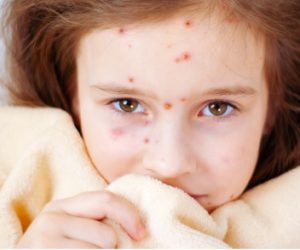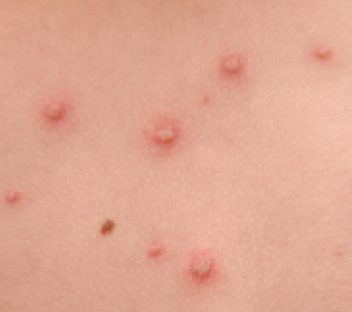
Chickenpox
Chickenpox is medically considered to be a mild disease in children. It is more severe when contracted by infants, adolescents, pregnant woman, and anyone with a weakened immune system.
Chickenpox Symptoms
Symptoms: The first symptoms of chickenpox usually develop 14 to 16 days after infection. Early symptoms may include fever, lack of appetite, and flu like symptoms such as muscle aches, headaches, sore throat and cough.
The itchy rash that is the hallmark of the infection usually develops 1 or 2 days after the first symptoms start. The rash, a distinctive red spot which is soon crowned with a small blister, often begins on the chest and back, and then spreads to the face, scalp, arms, and legs. New red spots will typically form during the first week of infection, and the typical chickenpox infection will result in about 200-500 blisters. About 10 days after the formation of the first spot, the rash and blisters should be well on their way to healing.
Get Medical Help If:
Chickenpox is medically considered to be a mild disease in children. It is more severe when contracted by infants, adolescents, pregnant woman, and anyone with a weakened immune system. Anyone with chickenpox should be monitored for high fever, bacterial infection (pus, odor, redness and extreme tenderness around the spots),disorientation, frequent vomiting, muscle stiffness and difficulty breathing.
Is it contagious? Yes. Until the blisters have dried out and scabbed over, people with chickenpox should avoid contact with anyone who has not had, or been vaccinated against chickenpox, as well as all pregnant women, infants and people with compromised immune systems.
Complications: Postherpetic neuralgia (PHN), a persistent burning, tingling or pain in the area where the rash was, is the most common complication of the herpes zoster virus. Early antiviral treatment for shingles may help to avert PHN.
Chickenpox Treatment
- Treatments for chickenpox focus on alleviating symptoms as there is no cure for the infection. Look for over-the-counter medications/astringents intended to relieve itchiness, blisters, and skin irritation.
- Cool baths, rest, and exposing the rash to air as much as possible (as opposed to covering it with clothing, bed sheets or blankets) can help to increase comfort and promote healing.
- If the itchiness cannot be managed with non-prescription topical products, your healthcare provider may recommend an over-the-counter antihistamine.
- If an infection occurs, your healthcare provider will prescribe antibiotics.
- Adults who have contracted chickenpox usually receive more aggressive treatment, including antiviral drugs, to help reduce possible complications.
- As many as 60% of adults in the United States carry the oral herpes virus. About one million Americans suffer from shingles every year. 98% of adults in the U.S. have had chickenpox, and anyone who has ever had chickenpox is at risk for shingles.
- 2000 years ago, the Roman emperor Tiberius banned kissing at public events in an attempt to control an oral herpes outbreak.
- “Chickenpox parties” were very popular before the vaccine that protects against the disease was developed. The idea was to expose children to the disease at a young age so they’d be immune for life and avoid the complications that come with getting it later in life.
Sources:
- MedlinePlus, the National Institutes of Health’s Website
- http://www.nlm.nih.gov/medlineplus/ency/article/000858.htm
- Shinglesinfo.com (stats on chickenpox and shingles, contagious facts, symptoms)
- http://www.shinglesinfo.com/shinglesinfo/shingles-risk.jsp
- http://kidshealth.org/parent/infections/skin/chicken_pox.html
- http://www.cdc.gov/shingles/hcp/clinical-overview.html
- webMD
- http://www.webmd.com/skin-problems-and-treatments/shingles/understanding-shingles-symptoms
- http://pathmicro.med.sc.edu/virol/herpes.htm
- http://www.patient.co.uk/doctor/human-herpes-viruses
- http://www.nlm.nih.gov/medlineplus/herpessimplex.html
